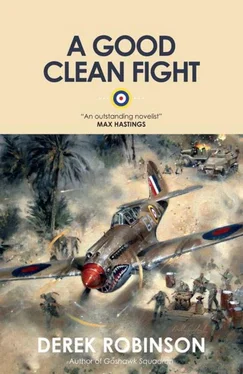Meanwhile: food.
Compared with the average soldier in the Western Desert, the men of the SAS ate like kings. Lampard’s patrol lined up for sardines, meatloaf, fried onions, tinned potatoes, pickles, tinned vegetables, tinned peaches, cheese and biscuits. Each man got two pints of tea. There was jam and syrup and, if the patrol commander said so, an issue of rum.
Lampard looked at his men. Nobody had washed in two weeks. Hair, beards and uniforms were filthy from a blend of desert dust and Jebel dirt and the greases and oils applied to weapons and vehicles, all of it evenly distributed by the action of sweat. The men took their loaded mess tins and moved away and ate the food steadily and blankly, not looking at each other, certainly not looking at the sunset, which was releasing a sudden flood of startlingly lovely colors, greens and pinks and mauves. “Rum,” Lampard said to the cook, who nodded. But even that word failed to turn any other heads.
When they had finished eating, Lampard collected his second pint of tea (the one with the reward of rum in it) and took Sergeant Davis aside. “What went wrong?” he asked.
Davis cleaned his mess tin in the sand. He held it up to the fading, spilled-paintbox light so that he could see into the corners. He murmured, “Dear, dear.” He cleaned it again, checked it again, turned it upside-down and banged it with his hand to shake the last few grains loose. “Difficult to know where to begin,” he said.
Lampard slowly walked away. Twenty paces. Davis counted them. He turned and walked back. Nineteen paces. “You lost a pace somewhere,” Davis said. “My old drill sergeant wouldn’t have liked that. He’d have sent you back to find the bloody thing.”
“Suppose we start again.” Lampard sipped his tea. “What went wrong?”
Davis was ready this time. “Not for me to say, sir. But I can tell you what happened. One of those wop armored cars got around the salt marsh somehow, and it clobbered us.”
“Why didn’t you see it coming?”
“I’ve wondered about that myself. Two reasons. One is, as soon as their cars came out of the oasis and started firing, we decided to pull back. So we weren’t watching them all that closely, especially as we had a bit of trouble turning the wireless truck. The other reason is the armored car that hit us didn’t come flying across the bog. It came sneaking up a little wadi on the other flank.”
Lampard folded his arms and let his heavy head sink until his chin would go no further while he absorbed this information. “What next?” he asked. His voice was so gruff it was almost a growl.
“Next… Well, next the Eye-ties fired a burst and hit the wireless truck. Hit the tires, front and rear, so I knew that was that, and we decided to get out quick. That was when Mr. Waterman got upset about leaving his code books in the truck, so he went off to get them, and while he was inside the truck the Eye-ties gave it several squirts and I reckon they hit the petrol tank. Like putting a match to a gas-ring. Whoosh! Up she went.”
The sun had almost gone. The temperature was falling in a rush; soon it would be time for a woolen cardigan. “It must have been an extremely small wadi,” Lampard said.
“Big enough.”
“What I mean is, there was no reason to expect an attack from that quarter.”
Sergeant Davis said nothing. Enough light remained for Lampard to see the look in his eyes: a look that said Not for me to say, sir .
“On the other hand,” Lampard said, “on this sort of job there’s always reason to expect an attack from any quarter.”
Davis said nothing in the same expressive way.
“On the other other hand,” Lampard said, “no risk, no win. And we did get the Storch.”
“So we did,” Davis said. “We got the Storch.”
Normally everyone sat around for an hour or two, talking, maybe listening to the BBC. Not now. After driving all night and all day they wanted only sleep. A couple of fitters worked on their vehicles for an hour or so, but by eight p.m. they too were wrapped in their blankets. Nothing moved in the desert; it was as still and silent as the sky. For the best part of twelve hours the members of the patrol slept like dead men, which in some cases was good practice.
Soon after dawn, Gibbon saw Dunn stowing his blankets in the truck, and walked over. “You’re a clever chap, Mike,” he said quietly. “Maybe you can explain what we were supposed to be up to, yesterday.”
Gentle flattery from Gibbon put Dunn on the alert. “What d’you mean?” he asked. He knew what Gibbon meant.
“Of course, I’m only the bloody silly navigator,” Gibbon said. “What do I know about the art of war? It seemed to me yesterday that we were in the wrong bloody place at the wrong bloody time, risking the whole bloody patrol for the sake of a twopenny-ha’penny target that wasn’t worth five rounds rapid. But of course I could be wrong.”
“We did hit the plane,” Dunn said.
“Bang goes tuppence-ha’penny,” Gibbon said. “Yippee.”
“It’s not as simple as that.”
Gibbon twitched his nostrils. Bacon was frying. “Burned pig!” he said. “Nothing like it, is there?”
“That’s not very funny,” Dunn said.
“Nobody ever caught the pig laughing,” Gibbon said, “so I’m sure you’re right.”
They walked to the fire and watched the cook at work. Lampard joined them. “Ah, bacon!” he said.
Gibbon cleared his throat. “I was just thinking about yesterday’s little battle,” he said.
Lampard stretched and yawned and waited.
“Hot stuff,” Gibbon said.
“Just a skirmish.”
“I bet the Italians claim a major victory. Big British attack repelled with heavy casualties.”
“No doubt. But it was still just a skirmish.”
“No heavy casualties?”
That made Lampard look sharply at Gibbon. “You know the score,” he said. “We had a spot of bad luck.”
“Ah, is that what it was?” Gibbon asked. “A spot of bad luck?”
Dunn said: “For Christ’s sake, shut up, Corky.”
“Just trying to put myself in the picture, Mike.”
Lampard snorted to blow some flies off his beard. “I bet I could find a fuel dump in Jalo Oasis at night,” he said. “And an ammo dump. How about it, Corky? You and me in the jeeps with a couple of chaps. You navigate and I steal some fuel, and then we go marauding around the Jebel. Are you on?” Lampard slapped his hands and infuriated the flies.
Gibbon tried to think of a good reason why not, and couldn’t. He was saved by Sergeant Davis. “The tires won’t stand it,” Davis said.
“Oh well,” Lampard said. “Another time, perhaps.”
Davis was right. They had to mend six punctures to cover the remaining two hundred kilometers to Kufra, which was a big, sprawling, well-found oasis with plenty of stores, including new tires. Kufra was an SAS base, so Lampard was able to radio HQ in Cairo and report his arrival. Cairo ordered the patrol home.
CHAPTER TWO
More Bright Breasts
“Ping-pong is not an Olympic sport,” Henry Lester said. “What you’ve got here in the desert is a ping-pong war. That’s why the public don’t buy it. It’s not box-office.”
“For Pete’s sake, Henry,” his wife said. “Put a sock in it and eat your ice cream.”
They were in the Gezira Sporting Club in Cairo, having dinner with a mixed bunch of journalists and army officers, and all night Lester had been trying to provoke a winnable argument. He was forty-one, shortish, chunky, with a receding crewcut, and he represented a Chicago newspaper whose readers like to be told just what the hell was going on in the world, short and sharp, without a lot of tap-dancing and blowing bubbles. So Lester held short, sharp, strong opinions about almost everything. “I’ll say this for Cairo,” he said. “They make good ice cream, and that’s the only single, solitary thing to be said for the place.”
Читать дальше












